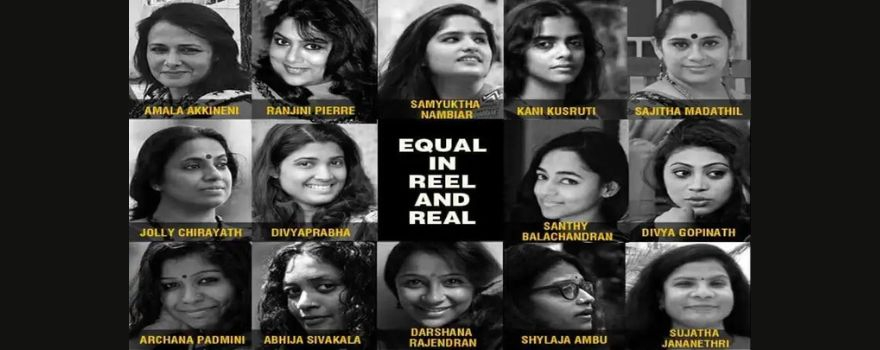Malayalam Cinema’s Long Road to Justice Post-Hema Committee Report
20 JAN 2025
This article, originally published by The News Minute, delves into the aftermath of the Hema Committee report, shedding light on systemic issues, survivor struggles, and the slow march toward equity in the Malayalam film industry.

The Hema Committee report, released five months ago, sent shockwaves through the Malayalam film industry, unearthing a deeply ingrained culture of sexual abuse and systemic oppression. Though the report’s release marked a historic moment, its aftermath has been fraught with challenges, leaving survivors grappling with trauma and questions about justice. The journey to change remains arduous, yet the cracks in the facade of impunity offer a glimmer of hope.
The year 2024 began with Malayalam cinema basking in the glory of films like Aavesham, Manjummel Boys, and Premalu. However, the narrative shifted dramatically with the release of the Hema Committee report in August. This landmark investigation, initiated in the wake of Kerala’s MeToo movement, exposed rampant sexual harassment, exploitation, and systemic inequities within the industry. Compiled by a three-member panel—Justice K Hema, former bureaucrat KB Valsalakumari, and actor Sarada—the report was the culmination of relentless advocacy by the Women in Cinema Collective (WCC), rights activists, and journalists. Despite its significant revelations, the Kerala government’s decision to release a heavily redacted version sparked criticism, shielding the identities of key perpetrators and diluting its impact.
For survivors like Sanjana (name changed), the report’s release was both cathartic and retraumatizing. Having accused a prominent actor of rape during the height of the MeToo movement, her testimony never made it into the report as it was filed late. Still, the media frenzy surrounding the report compelled her to revisit her pain and take her complaint to the police. While an FIR was lodged, the accused was granted bail, leaving Sanjana disillusioned. She eventually left Kerala, seeking solace in anonymity in another state. Her story encapsulates the disheartening reality that the truth, while liberating, can also exact a heavy toll on those who dare to speak it.
The fallout from the report was unprecedented, unmasking several revered figures in Malayalam cinema. Names like CPI(M) MLA Mukesh, actors Siddique and Jayasurya, and directors Ranjith and VA Shrikumar surfaced, among others. Survivors’ testimonies laid bare the “casting couch” culture, pay disparities, and gross violations of labor rights. Yet, systemic barriers persisted. Organizations like the Film Employees Federation of Kerala (FEFKA) and affiliated unions wielded their power to silence dissenters. Survivors like hairstylist Sivappriya Maneeshya faced professional ostracism, with unions canceling memberships and industry insiders boycotting their services. Maneeshya’s struggle to find work in the wake of her testimony highlighted the enduring stranglehold of patriarchal structures.


Members of Women in Cinema Collective (Pc: Desimartini)
The state government’s lethargic response further compounded the issue. While a Special Investigation Team (SIT) comprising four women IPS officers was constituted, the four-year delay in releasing the report emboldened perpetrators and weakened survivors’ faith in justice. The SIT’s approach has also drawn mixed reactions. While some survivors felt empowered by the proactive engagement of officers like Poonkuzhali IPS, others criticized the investigative overreach, alleging breaches of privacy and coercion.
Amid this chaos, industry unions like FEFKA and the All Kerala Cine Make-Up Artists and Hair Stylists Union revealed their regressive stance. Survivors who spoke out were vilified, while accused individuals faced little to no repercussions. The unions’ actions starkly contrasted with their initial commitments to support survivors, underscoring the pervasive culture of impunity. The broader industry, too, has been slow to adopt systemic reforms, with labor violations and unsafe work environments remaining rampant.
Despite these challenges, the Hema Committee report ignited critical conversations and spurred grassroots movements. New collectives like the Progressive Filmmakers Association and Creative Women’s Collective emerged, advocating for gender equity and better labor practices. Activists like Ajayan Adat and Ajitha have called for structural changes, emphasizing the need for government intervention to enforce the committee’s recommendations.
The Women in Cinema Collective, central to the report’s release, continues to face backlash. Founding members like Revathy and Rima Kallingal have endured targeted hate campaigns and character assassination. Yet, their resilience underscores the significance of solidarity in the face of systemic oppression. As actor Anjali Menon observed, the smaller victories—from survivors feeling heard to production houses implementing internal committees—signal incremental progress.
Ultimately, the report’s legacy lies in its ability to sustain momentum for change. While the path to justice is riddled with obstacles, the courage of survivors and the persistent efforts of allies have begun to dismantle entrenched hierarchies. As Kerala grapples with this reckoning, the hope remains that the industry will one day transform into a space that values dignity, equity, and accountability.
This article was originally published by The News Minute.

1732873755.jpg)



















